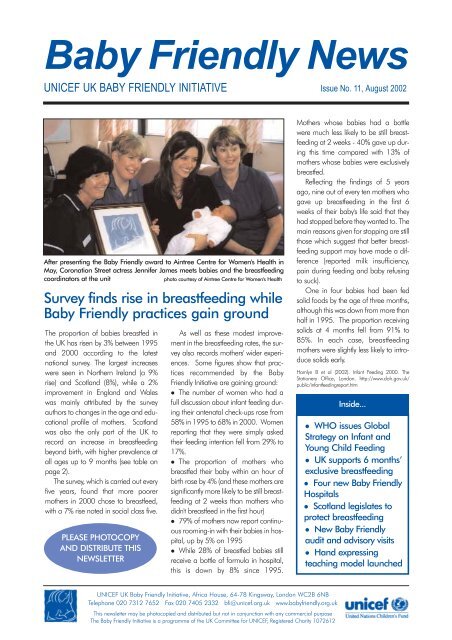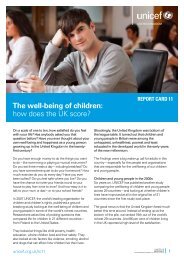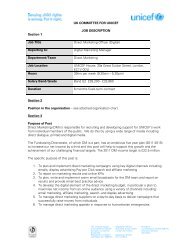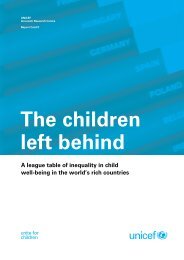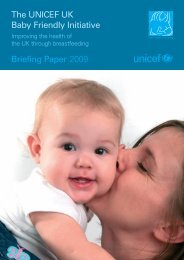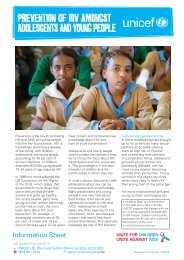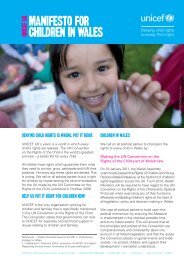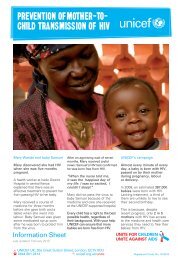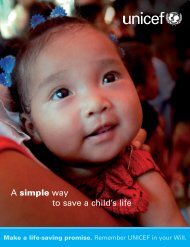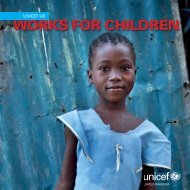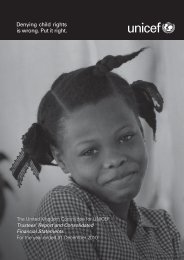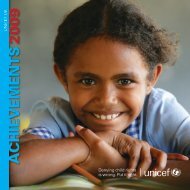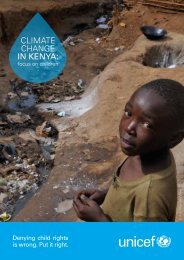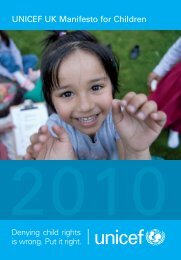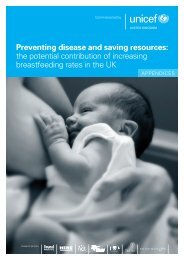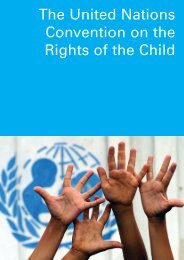Baby Friendly News 11, August 2002 - Unicef UK
Baby Friendly News 11, August 2002 - Unicef UK
Baby Friendly News 11, August 2002 - Unicef UK
Create successful ePaper yourself
Turn your PDF publications into a flip-book with our unique Google optimized e-Paper software.
<strong>Baby</strong> <strong>Friendly</strong> <strong>News</strong><br />
UNICEF <strong>UK</strong> BABY FRIENDLY INITIATIVE Issue No. <strong>11</strong>, <strong>August</strong> <strong>2002</strong><br />
After presenting the <strong>Baby</strong> <strong>Friendly</strong> award to Aintree Centre for Women's Health in<br />
May, Coronation Street actress Jennifer James meets babies and the breastfeeding<br />
coordinators at the unit<br />
photo courtesy of Aintree Centre for Women's Health<br />
Survey finds rise in breastfeeding while<br />
<strong>Baby</strong> <strong>Friendly</strong> practices gain ground<br />
The proportion of babies breastfed in<br />
the <strong>UK</strong> has risen by 3% between 1995<br />
and 2000 according to the latest<br />
national survey. The largest increases<br />
were seen in Northern Ireland (a 9%<br />
rise) and Scotland (8%), while a 2%<br />
improvement in England and Wales<br />
was mainly attributed by the survey<br />
authors to changes in the age and educational<br />
profile of mothers. Scotland<br />
was also the only part of the <strong>UK</strong> to<br />
record an increase in breastfeeding<br />
beyond birth, with higher prevalence at<br />
all ages up to 9 months (see table on<br />
page 2).<br />
The survey, which is carried out every<br />
five years, found that more poorer<br />
mothers in 2000 chose to breastfeed,<br />
with a 7% rise noted in social class five.<br />
PLEASE PHOTOCOPY<br />
AND DISTRIBUTE THIS<br />
NEWSLETTER<br />
As well as these modest improvement<br />
in the breastfeeding rates, the survey<br />
also records mothers' wider experiences.<br />
Some figures show that practices<br />
recommended by the <strong>Baby</strong><br />
<strong>Friendly</strong> Initiative are gaining ground:<br />
• The number of women who had a<br />
full discussion about infant feeding during<br />
their antenatal check-ups rose from<br />
58% in 1995 to 68% in 2000. Women<br />
reporting that they were simply asked<br />
their feeding intention fell from 29% to<br />
17%.<br />
• The proportion of mothers who<br />
breastfed their baby within an hour of<br />
birth rose by 4% (and these mothers are<br />
significantly more likely to be still breastfeeding<br />
at 2 weeks than mothers who<br />
didn't breastfeed in the first hour)<br />
• 79% of mothers now report continuous<br />
rooming-in with their babies in hospital,<br />
up by 5% on 1995<br />
• While 28% of breastfed babies still<br />
receive a bottle of formula in hospital,<br />
this is down by 8% since 1995.<br />
Mothers whose babies had a bottle<br />
were much less likely to be still breastfeeding<br />
at 2 weeks - 40% gave up during<br />
this time compared with 13% of<br />
mothers whose babies were exclusively<br />
breastfed.<br />
Reflecting the findings of 5 years<br />
ago, nine out of every ten mothers who<br />
gave up breastfeeding in the first 6<br />
weeks of their baby's life said that they<br />
had stopped before they wanted to. The<br />
main reasons given for stopping are still<br />
those which suggest that better breastfeeding<br />
support may have made a difference<br />
(reported milk insufficiency,<br />
pain during feeding and baby refusing<br />
to suck).<br />
One in four babies had been fed<br />
solid foods by the age of three months,<br />
although this was down from more than<br />
half in 1995. The proportion receiving<br />
solids at 4 months fell from 91% to<br />
85%. In each case, breastfeeding<br />
mothers were slightly less likely to introduce<br />
solids early.<br />
Hamlyn B et al (<strong>2002</strong>). Infant Feeding 2000. The<br />
Stationery Office, London. http://www.doh.gov.uk/<br />
public/infantfeedingreport.htm<br />
Inside...<br />
• WHO issues Global<br />
Strategy on Infant and<br />
Young Child Feeding<br />
• <strong>UK</strong> supports 6 months’<br />
exclusive breastfeeding<br />
• Four new <strong>Baby</strong> <strong>Friendly</strong><br />
Hospitals<br />
• Scotland legislates to<br />
protect breastfeeding<br />
• New <strong>Baby</strong> <strong>Friendly</strong><br />
audit and advisory visits<br />
• Hand expressing<br />
teaching model launched<br />
UNICEF <strong>UK</strong> <strong>Baby</strong> <strong>Friendly</strong> Initiative, Africa House, 64-78 Kingsway, London WC2B 6NB<br />
Telephone 020 7312 7652 Fax 020 7405 2332 bfi@unicef.org.uk www.babyfriendly.org.uk<br />
This newsletter may be photocopied and distributed but not in conjunction with any commercial purpose<br />
The <strong>Baby</strong> <strong>Friendly</strong> Initiative is a programme of the <strong>UK</strong> Committee for UNICEF, Registered Charity 1072612
England Northern United<br />
& Wales Scotland Ireland Kingdom<br />
Age of baby 1995 2000 1995 2000 1995 2000 1995 2000<br />
Birth 68 71 55 63 45 54 66 69<br />
1 week 58 57 46 50 35 37 56 55<br />
2 weeks 54 54 44 47 32 34 53 52<br />
6 weeks 44 43 36 40 25 26 42 42<br />
4 months 28 29 24 30 12 14 27 28<br />
6 months 22 22 19 24 8 10 21 21<br />
Percentage of babies breastfed at ages up to 6 months by country (1995 and 2000)<br />
Hamlyn B et al (<strong>2002</strong>). Infant Feeding 2000. The Stationery Office, London.<br />
Global Strategy calls for national action<br />
Every government in the world should<br />
now be developing a wide ranging<br />
national policy and action plan on<br />
infant and young child feeding following<br />
the endorsement of a key World<br />
Health Organisation proposal in May.<br />
The <strong>UK</strong>, along with every other WHO<br />
member state approved the Global<br />
Strategy on Infant and Young Child<br />
Feeding at the World Health Assembly.<br />
The Global Strategy updates the<br />
1990 Innocenti Declaration, which led<br />
to significant developments in breastfeeding<br />
support over the last decade.<br />
Governments are now expected to<br />
adopt policies and strategies covering<br />
the whole area of infant and young<br />
child feeding, including action to:<br />
• promote and support exclusive<br />
breastfeeding for six months and continued<br />
breastfeeding (with good complementary<br />
feeding practices) for up to<br />
24 months or beyond<br />
• ensure that all maternity services fully<br />
implement all Ten Steps to Successful<br />
Breastfeeding and to support the extension<br />
of the <strong>Baby</strong> <strong>Friendly</strong> Initiative into<br />
community and paediatric settings<br />
• legislate to end all promotion of artificial<br />
feeding and to protect the breastfeeding<br />
rights of working women<br />
- ensure that policies and practices take<br />
into account vulnerable groups such as<br />
refugees, mothers with HIV and those<br />
with disabilities or who are drug users.<br />
The Global Strategy also identifies<br />
the obligations and responsibilities of<br />
other organisations including local<br />
authorities, the health service, health<br />
professional and voluntary organisations,<br />
employers, trade unions and education<br />
bodies. The full document can<br />
be seen at www.babyfriendly.org.uk/<br />
pdfs/globalstrategy.pdf<br />
Breastfeeding strategies are already<br />
in place in Northern Ireland and Wales.<br />
No national policy or strategy exists in<br />
England or Scotland, although the<br />
Scottish Executive has asked its 15<br />
Health Boards to adopt local strategies.<br />
WHO's Global Strategy should now act<br />
as an impetus for further action, both in<br />
developing new policies and in supporting<br />
their implementation.<br />
The Global Strategy was developed<br />
in consultation with the WHO's member<br />
states. The first consultation took<br />
place at a seminar arranged by the<br />
<strong>Baby</strong> <strong>Friendly</strong> Initiative in Scotland in<br />
September 2000, which involved input<br />
from the Scottish Executive, health service<br />
managers and infant feeding coordinators,<br />
health professional and voluntary<br />
organisations, researchers and<br />
individuals working with refugees, drug<br />
users and HIV positive people.<br />
Previous Resolutions from the World<br />
Health Assembly have led to ground<br />
breaking progress in infant and young<br />
child feeding. These include the adoption<br />
of the International Code of<br />
Marketing of Breastmilk Substitutes in<br />
1981 and the endorsement of the <strong>Baby</strong><br />
<strong>Friendly</strong> Initiative in 1992.<br />
<strong>UK</strong> support for six<br />
months' exclusive<br />
breastfeeding<br />
Speaking at the launch of National<br />
Breastfeeding Awareness Week in May,<br />
Imogen Sharp, Head of Cardiovascular<br />
Disease and Cancer Prevention at the<br />
Department of Health, acknowledged<br />
that the WHO recommendation of<br />
exclusive breastfeeding for six months<br />
should be adopted in the <strong>UK</strong>.<br />
Most health professionals are still<br />
working to the 1994 advice that babies<br />
need no food or drink than breastmilk<br />
for the first 4 to 6 months, but the adoption<br />
of a new recommendation by<br />
WHO last year meant that there has<br />
been confusion around when mothers<br />
should be advised to start giving complementary<br />
foods. It now appears that a<br />
clear statement may soon be made.<br />
The <strong>UK</strong> Government voted in favour<br />
of the 6 month position at the World<br />
Health Assembly in May 2001, where it<br />
was agreed "to strengthen activities and<br />
develop new approaches to protect,<br />
promote and support exclusive breastfeeding<br />
for six months as a public<br />
health recommendation… and to provide<br />
safe and appropriate complementary<br />
foods, with continued breastfeeding<br />
for up to two years of age or beyond".<br />
This stance was re-iterated at the <strong>2002</strong><br />
Assembly earlier this year.<br />
The Government's Scientific Advisory<br />
Committee on Nutrition agreed in<br />
September 2001 that "there is sufficient<br />
scientific evidence that exclusive breastfeeding<br />
for 6 months is nutritionally<br />
adequate". It noted that early weaning<br />
is common in the <strong>UK</strong> and repeated a<br />
warning against weaning before 4<br />
months (17 weeks) The Committee also<br />
noted that individual circumstances<br />
should be taken into account when<br />
advising mothers over when to introduce<br />
foods other than breastmilk.<br />
The centre of this newsletter is a poster<br />
on UNICEF’s worldwide drive to eliminate<br />
maternal and neonatal tetanus,<br />
which kills more than 200,000 newborns<br />
and 30,000 mothers each year.<br />
<strong>Baby</strong> <strong>Friendly</strong> <strong>News</strong> 2 No <strong>11</strong>, <strong>August</strong> <strong>2002</strong>
<strong>Baby</strong> <strong>Friendly</strong> rising in Wales and West Midlands,<br />
while Scotland has most <strong>Baby</strong> <strong>Friendly</strong> births<br />
Four hospitals in Wales and the West<br />
Midlands have been accredited as<br />
<strong>Baby</strong> <strong>Friendly</strong>. North Staffordshire<br />
Hospital in Stoke became the West<br />
Midlands' first <strong>Baby</strong> <strong>Friendly</strong> hospital in<br />
May, closely followed by Wordsley in<br />
Stourbridge. Meanwhile, the total<br />
number of <strong>Baby</strong> <strong>Friendly</strong> hospitals in<br />
Wales was doubled as the Royal<br />
Glamorgan Hospital and Nevill Hall<br />
Hospital in Abergavenny achieved their<br />
accreditation.<br />
Dame Lorna Muirhead, President of<br />
the Royal College of Midwives, presented<br />
the <strong>Baby</strong><br />
<strong>Friendly</strong> award to<br />
North Staffordshire<br />
Percentage of births<br />
Hospital at a ceremony<br />
on 22 July. <strong>Baby</strong> <strong>Friendly</strong> Hospitals<br />
that take place in<br />
The hospital which<br />
<strong>August</strong> <strong>2002</strong><br />
serves a population<br />
with some significant areas of<br />
deprivation, has seen a 4% increase in<br />
its breastfeeding initiation rate since<br />
1998. More than 300 maternity and<br />
80 neonatal staff were trained in the<br />
process of gaining the award.<br />
Wordsley Maternity Unit has seen an<br />
increase of 3% in its breastfeeding initiation<br />
over the past year, which translates<br />
into a 4% rise in the breastfeeding<br />
rate at transfer to community. Staff at<br />
the hospital report that more mothers<br />
are volunteering to help with the local<br />
breastfeeding support groups.<br />
Royal Glamorgan Hospital in<br />
Llantrisant became the third hospital in<br />
Wales to achieve <strong>Baby</strong> <strong>Friendly</strong> accreditation<br />
in May. The unit achieved the<br />
unusual distinction of passing the<br />
assessment in one go. The process is<br />
normally a two stage process, with<br />
Northern<br />
England Wales Scotland Ireland Kingdom<br />
8 19 34 20 13<br />
problem areas being reinvestigated at a<br />
second visit. However, the high standards<br />
on the criteria for each of the Ten<br />
Steps meant that a follow-up visit was<br />
not necessary.<br />
The proportion of babies breastfed<br />
at Nevill Hall Hospital has leapt dramatically<br />
since it began work towards<br />
<strong>Baby</strong> <strong>Friendly</strong> accreditation last year.<br />
68% of babies are now breastfed at<br />
birth - a rise of 20% over the almost static<br />
figures for the previous five years.<br />
Staff at the hospital report that mothers<br />
are very pleased with the introduction of<br />
skin-to-skin contact and other <strong>Baby</strong><br />
<strong>Friendly</strong> practices. They are supported<br />
in the community by a new peer support<br />
group.<br />
Following the accreditation of<br />
Aintree Centre for Women's Health and<br />
Calderdale Royal Hospital earlier in the<br />
year, the new awards<br />
United bring the total number<br />
to 44. Scotland<br />
continues to lead the<br />
way, with a third of<br />
all babies born in<br />
<strong>Baby</strong> <strong>Friendly</strong> hospitals<br />
(and a further third in units with a<br />
Certificate of Commitment). Northern<br />
Ireland and Wales follow with 1 in 5<br />
births taking place in <strong>Baby</strong> <strong>Friendly</strong> hospitals.<br />
A full list of <strong>Baby</strong> <strong>Friendly</strong> awards<br />
can be seen on our web site at<br />
www.babyfriendly.org.uk/list.asp<br />
Scotland protects the right to breastfeed<br />
Legislation protecting a mother's right to<br />
breastfeed in public could soon be<br />
adopted in Scotland. Elaine Smith MSP<br />
has put forward a bill to the Scottish<br />
Parliament which would make it a criminal<br />
offence for anyone to prevent a<br />
mother from breastfeeding in any public<br />
place or licensed premises where<br />
children are otherwise welcomed.<br />
Scottish Health Minister Malcolm<br />
Chisholm has indicated his support for<br />
the principle of Ms Smith's bill, which<br />
has received cross-party backing. An<br />
advisory committee including representatives<br />
from the UNICEF <strong>UK</strong> <strong>Baby</strong><br />
<strong>Friendly</strong> Initiative and other health<br />
organisations has been established to<br />
help guide the bill through parliament.<br />
Campaigners for the bill are encouraging<br />
Scottish residents to ask their<br />
MSPs to support it. (MSPs can be contacted<br />
c/o The Scottish Parliament,<br />
Edinburgh EH99 1SP - to find out who<br />
your MSPs are, call the Scottish<br />
Parliament on 0131 348 5000 or visit<br />
www.scottish.parliament.uk). A 6-week<br />
consultation period on the bill is expected<br />
to begin in September. The consultation<br />
paper will be available via the<br />
Scottish Parliament's web site or from<br />
Elaine Smith's office at the Parliament.<br />
Meanwhile, breastfeeding remains<br />
prohibited in the chamber, committees<br />
and public galleries of the Parliament<br />
buildings in London following a decision<br />
in March by the Speaker Michael<br />
Martin not to overturn a ban imposed<br />
by his predecessor.<br />
New advisory visits to<br />
tackle problem areas<br />
If you are facing a particular difficulty<br />
with a specific part of the <strong>Baby</strong> <strong>Friendly</strong><br />
best practice standards, you may find it<br />
useful to have an advisory visit from a<br />
member of the <strong>Baby</strong> <strong>Friendly</strong> team.<br />
Advisory visits are tailored to your<br />
needs and give specialised advice or<br />
training on specific issues. For example,<br />
if you are having difficulties in improving<br />
staff’s positioning and attachment<br />
skills, an advisory visit could teach key<br />
workers how to conduct effective clinical<br />
practice sessions. A hospital struggling<br />
to adopt Step 6 could use a visit<br />
for specific teaching on hypoglycaemia.<br />
For more details or to discuss your<br />
requirements, contact the <strong>Baby</strong> <strong>Friendly</strong><br />
Initiative office on 020 7312 7652.<br />
<strong>Baby</strong> <strong>Friendly</strong> <strong>News</strong> 3 No <strong>11</strong>, <strong>August</strong> <strong>2002</strong>
Hand expressing teaching model launched<br />
A model to support health professionals<br />
learning how to teach hand expressing<br />
is now available following a collaboration<br />
between the UNICEF <strong>UK</strong> <strong>Baby</strong><br />
<strong>Friendly</strong> Initiative and Limbs & Things<br />
Ltd.<br />
The breast model, which was previewed<br />
at the <strong>Baby</strong> <strong>Friendly</strong> Initiative's<br />
2001 Conference, is designed so that<br />
simulated 'milk' is expressed from the<br />
nipple when a correct hand expressing<br />
technique is used. Designed as a teaching<br />
and learning tool for health professionals<br />
(not mothers), it is realistic in<br />
shape, texture and proportion, and is<br />
warm to the touch.<br />
The <strong>Baby</strong> <strong>Friendly</strong> Initiative recommends<br />
that all breastfeeding mothers<br />
be taught how to express their milk by<br />
hand as this provides a 'first aid' measure<br />
in the event of breastfeeding complications<br />
and equips women with a<br />
means of expressing milk in a situation<br />
where their baby cannot breastfeed<br />
directly. However, health care facilities<br />
working towards assessment for <strong>Baby</strong><br />
<strong>Friendly</strong> accreditation commonly report<br />
difficulties in teaching this skill to health<br />
professionals.<br />
The Hand Expression Breast Model<br />
costs £450 plus VAT & carriage and<br />
can be ordered from Limbs and Things<br />
Ltd (Product no. 40103) - on 0<strong>11</strong>7 3<strong>11</strong><br />
0500. £50 from the sale of each model<br />
will be donated to the UNICEF <strong>UK</strong> <strong>Baby</strong><br />
<strong>Friendly</strong> Initiative.<br />
Bed sharing policy<br />
and leaflet revised<br />
The <strong>Baby</strong> <strong>Friendly</strong> Initiative's sample<br />
policy on babies sharing their mother's<br />
bed in hospital and the accompanying<br />
leaflet for parents 'Sharing a<br />
bed with your baby' have been<br />
amended. The new versions address<br />
the common differences in the<br />
sleeping positions of breast- and<br />
bottle feeding mothers and mothers<br />
who are unable to respond fully to<br />
their babies for reasons other than<br />
sedation, tiredness or illness (e.g.<br />
disability). The statement on maternal<br />
tiredness is reworded to give<br />
more explanation and guidance.<br />
The documents can be seen at www.<br />
babyfriendly.org.uk/bedshare.asp<br />
Recent research…<br />
Metabolic adaptation of<br />
SGA babies<br />
Term healthy babies respond to the normal<br />
post-delivery decline in blood glucose<br />
levels by producing ketone bodies,<br />
which provide an alternative energy<br />
source for their brains. This study investigated<br />
the ability of small for gestational<br />
age (SGA) babies to produce ketone<br />
bodies, depending on whether they<br />
were exclusively breastfed, breastfed<br />
with formula supplements or exclusively<br />
formula fed. There were no differences<br />
in blood glucose levels between the<br />
groups, but ketone concentrations were<br />
highest in babies who were exclusively<br />
breastfed. Peak ketone body concentration<br />
was negatively associated with<br />
the volume of formula received. The<br />
authors conclude that neonatal ability<br />
to generate ketone bodies depends<br />
more on successful breastfeeding than<br />
on size for gestational age or nutritional<br />
status and that routine formula supplementation<br />
of SGA infant should not<br />
be recommended.<br />
De Rooy L and Hawdon J. Nutritional factors that affect<br />
the postnatal metabolic adaptation of full-term smalland<br />
large-for-gestational age infants. Pediatrics <strong>2002</strong>;<br />
109 (3) (www.pediatrics.org/cgi/content/full/109/3/e42)<br />
Breast cancer<br />
A review of 47 breast cancer studies<br />
that included information on breastfeeding<br />
patterns found that the longer<br />
women breastfeed, the more they are<br />
protected against breast cancer. The<br />
relative risk of breast cancer decreased<br />
by 4·3% (95% CI 2·9-5·8; p
Derby Mayor launches<br />
breastfeeding campaign<br />
Managers of Derby's shops, restaurants<br />
and other public premises are the target<br />
of a campaign by the newly appointed<br />
Mayor, who wants to extend <strong>Baby</strong><br />
<strong>Friendly</strong> principles across the city.<br />
Councillor Robin Turner has issued a<br />
leaflet in which he promises to support<br />
premises which welcome breastfeeding,<br />
while refusing to visit places which have<br />
not signed up to the campaign.<br />
A framed copy of the <strong>Baby</strong> <strong>Friendly</strong><br />
Initiative's 'Welcome to Breastfeed Here'<br />
poster will be presented by the Mayor to<br />
premises which welcome breastfeeding<br />
mothers and provide suitable seating in<br />
their public areas. Councillor Turner<br />
said 'this campaign will be of long term<br />
benefit for breastfeeding mothers and<br />
babies and will commercially benefit the<br />
managers of premises supporting it.'<br />
Adverts placed in the city centre and the<br />
local press will encourage people to<br />
use premises which join the campaign.<br />
Derby is home to the first GP surgery<br />
to achieve <strong>Baby</strong> <strong>Friendly</strong> status, as well<br />
as one of the <strong>UK</strong>'s first <strong>Baby</strong> <strong>Friendly</strong><br />
hospitals and one of the first Sure Start<br />
areas to have obtained a Certificate of<br />
Commitment.<br />
In brief<br />
Audit visits will support<br />
work on <strong>Baby</strong> <strong>Friendly</strong><br />
standards<br />
Health care facilities nearing readiness<br />
for a <strong>Baby</strong> <strong>Friendly</strong> assessment can now<br />
get extra support from the <strong>Baby</strong> <strong>Friendly</strong><br />
Initiative as they seek to monitor their<br />
progress towards accreditation.<br />
The newly launched Audit Visits will<br />
provide a snapshot of how well the Ten<br />
Steps or Seven Points are being implemented<br />
and will help health professionals<br />
to decide whether or not they are<br />
ready for a full <strong>Baby</strong> <strong>Friendly</strong> assessment.<br />
Facilities may also use them to<br />
help identify areas of weakness which<br />
require further attention.<br />
The visits last a single day and are<br />
run by two <strong>Baby</strong> <strong>Friendly</strong> Initiative assessors.<br />
They consist of interviews with<br />
small samples of staff, pregnant women<br />
and new mothers, using the same questionnaires<br />
and principles as are used at<br />
a full <strong>Baby</strong> <strong>Friendly</strong> assessment. The<br />
findings and relevant advice are reported<br />
at a feedback meeting at the end of<br />
the visit as well as in a written report.<br />
The audit visit costs £540. If you wish<br />
to book or to discuss the visits further,<br />
please call the <strong>Baby</strong> <strong>Friendly</strong> Initiative<br />
office on 020 7312 7652.<br />
'Breastfeeding Your <strong>Baby</strong>' is a video which provides information on the benefits<br />
and management of breastfeeding. The video is available in Urdu & English,<br />
Bengali & English or Gujarati & English from Mrs Quinn's Office, Women's<br />
Health Services, Tower View Offices, Queens Park Hospital, Blackburn BB2<br />
3HH, price £12.50 each including p&p (cheques to Blackburn, Hyndburn &<br />
Ribble Valley Health Care NHS Trust).<br />
The Breast Benefits education pack provides a tool for breastfeeding education<br />
in secondary schools with 13-15 year olds. The pack, which has been positively<br />
evaluated by young people, includes a fully comprehensive teacher's<br />
guide, visual aids including a short video, a quiz and postcard handouts. Breast<br />
Benefits was developed with a multi-disciplinary team including young people,<br />
researchers, educators, community workers and midwives. The pack is available<br />
for £40 (cheques payable to University of Brighton) from Rachael Lockey, Centre<br />
for Nursing and Midwifery Research, University of Brighton, Westlain House,<br />
Falmer, Brighton BN1 9PH.<br />
Please send us brief details of your activities and we will try to include<br />
them in future editions of <strong>Baby</strong> <strong>Friendly</strong> <strong>News</strong>. Inclusion does not necessarily<br />
mean endorsement by UNICEF or the <strong>Baby</strong> <strong>Friendly</strong> Initiative.<br />
Reply form<br />
Name: ..........................................<br />
Organisation: ...............................<br />
......................................................<br />
Address: ......................................<br />
......................................................<br />
......................................................<br />
......................................................<br />
......................................................<br />
Telephone: ....................................<br />
......................................................<br />
Please send:<br />
........ packs of 50 copies of the<br />
leaflet Feeding Your New <strong>Baby</strong> (for<br />
pregnant women) in .....................<br />
Arabic / Bengali / Gujerati / Hindi<br />
/ Mirpuri / Punjabi / Urdu (delete<br />
as applicable) @ £15.00 per pack<br />
....... packs of 50 copies of the<br />
leaflet Breastfeeding Your <strong>Baby</strong> (for<br />
new mothers) in Arabic / Bengali /<br />
Gujerati / Hindi / Mirpuri / Punjabi<br />
/ Urdu (delete as applicable) @<br />
£15.00 per pack<br />
n.b. These leaflets can be viewed at<br />
www.babyfriendly.org.uk/parents If you<br />
require the translated leaflets in more<br />
than one language, please supply full<br />
details on a separate sheet. The English<br />
language leaflets are sponsored by and<br />
available from <strong>Baby</strong> Welcome - 01737<br />
213161.<br />
....... A5 diary covers @ £1.50<br />
....... copies of Becoming <strong>Baby</strong><br />
<strong>Friendly</strong> @ £60.00 (video)<br />
Total for above order: £............<br />
Total from booking form overleaf:<br />
£............<br />
Total enclosed: £............<br />
Please send a cheque with order. We will<br />
invoice if necessary for orders of more than<br />
£50.00 on receipt of an official order. Please<br />
make cheques payable to UNICEF and return<br />
with this form to the UNICEF <strong>UK</strong> <strong>Baby</strong> <strong>Friendly</strong><br />
Initiative, Africa House, 64-78 Kingsway,<br />
London WC2B 6NB. Prices include VAT where<br />
appropriate and <strong>UK</strong> postage and packing.<br />
For overseas orders, please add 20%.<br />
For a complete resource list and order<br />
form, see www.babyfriendly.org.uk<br />
<strong>Baby</strong> <strong>Friendly</strong> <strong>News</strong> 7 No <strong>11</strong>, <strong>August</strong> <strong>2002</strong>
Booking form<br />
Name: ..........................................<br />
Organisation: ...............................<br />
......................................................<br />
Address: ......................................<br />
......................................................<br />
......................................................<br />
......................................................<br />
......................................................<br />
......................................................<br />
Telephone: ....................................<br />
......................................................<br />
Please add any additional names<br />
on a separate sheet of paper.<br />
Please book ....... place(s) at<br />
the UNICEF <strong>UK</strong> <strong>Baby</strong> <strong>Friendly</strong><br />
Initiative Annual Conference<br />
(Harrogate, 13-14 November) on:<br />
Both days / day 1 / day 2 *<br />
Price: Both days - £<strong>11</strong>5; Single day - £65.<br />
(Discount - £105 both days / £60 one day if<br />
if you book 5 or more places)<br />
*Please delete as applicable<br />
Please book ....... place(s) at<br />
the following Course in Breastfeeding<br />
Management:<br />
Town: ............................................<br />
Dates: ...........................................<br />
<strong>2002</strong> Price: 1 to 4 places - £245 each; 5 or<br />
more places - £200 each. 2003 Price: 1 to 4<br />
places - £255 each; 5 or more places -<br />
£210 each (all prices include VAT).<br />
Please call me to discuss our<br />
holding the Course in Breastfeeding<br />
Management for our own staff<br />
Total for the above order: £..........<br />
(Please see overleaf for ordering<br />
information.)<br />
UNICEF <strong>UK</strong> <strong>Baby</strong> <strong>Friendly</strong> Initiative<br />
Annual Conference <strong>2002</strong><br />
Day 1, Wednesday 13 November, 9.30 am to 5.00 pm<br />
Community and laboratory studies of night time interactions between mothers and<br />
babies and the risk of illness and infant death (Prof Peter Fleming, Professor of<br />
Infant Health and Developmental Physiology, University of Bristol)<br />
The relationship between breastfeeding and health in adolescence and adulthood<br />
(Dr Stewart Forsyth, Consultant Paediatrician, Ninewells Hospital, Dundee)<br />
Supporting drug users to breastfeed (Dr Mary Hepburn, Senior Lecturer, University<br />
of Glasgow)<br />
Working in Partnership with the UNICEF <strong>UK</strong> <strong>Baby</strong> <strong>Friendly</strong> Initiative - The Scottish<br />
experience (Jenny Warren, National Breastfeeding Advisor)<br />
UNICEF <strong>UK</strong>'s Child Exploitation Campaign (Anita Tiessen, Deputy Executive<br />
Director, UNICEF <strong>UK</strong>)<br />
Avoiding unnecessary supplements (Sue Ashmore, UNICEF <strong>UK</strong> <strong>Baby</strong> <strong>Friendly</strong><br />
Initiative)<br />
The <strong>Baby</strong> <strong>Friendly</strong> Initiative - recent developments (Andrew Radford, UNICEF <strong>UK</strong><br />
<strong>Baby</strong> <strong>Friendly</strong> Initiative)<br />
Day 2, Thursday 14 November, 9.30 am to 5.00 pm<br />
Tongue tie and breastfeeding (Dr Mervyn Griffiths, Consultant Paediatric and<br />
Neonatal Surgeon, Southampton General Hospital)<br />
Safety issues related to bottle feeding (Prof Mary Renfrew, Director, Mother and<br />
Infant Research Unit, University of Leeds)<br />
Breast feeding and infant consultation patterns in general practice, with some<br />
reflections on implementing <strong>Baby</strong> <strong>Friendly</strong> policies (Phil Wilson GP, Battlefield Road<br />
Surgery, Glasgow)<br />
Breastfeeding and the weaning process (Gill Rapley, UNICEF <strong>UK</strong> <strong>Baby</strong> <strong>Friendly</strong><br />
Initiative)<br />
Stepping out with the community (Mary Whitmore, The Breastfeeding Network)<br />
Maternal diet during breastfeeding (Andrew Radford, UNICEF <strong>UK</strong> <strong>Baby</strong> <strong>Friendly</strong><br />
Initiative)<br />
Case studies on milk banking, hand expressing, and using <strong>Baby</strong> <strong>Friendly</strong> standards<br />
and peer support in a Sure Start programme (Ann McCrea, Sperrin<br />
Lakeland Milk Bank; Rachel McLean, Derby City Hospital; Marie Timms, Sure<br />
Start Derby).<br />
Diary dates<br />
The UNICEF <strong>UK</strong> <strong>Baby</strong><br />
<strong>Friendly</strong> Initiative Annual<br />
Conference <strong>2002</strong><br />
Royal Hall, Harrogate International<br />
Centre, 13-14 November<br />
(To book or for details of any of these events,<br />
call 020 7312 7652, visit our web site or use<br />
the form opposite)<br />
The <strong>Baby</strong> <strong>Friendly</strong> Initiative<br />
Course in Breastfeeding<br />
Management<br />
Glasgow: 5, 6 & 26 September<br />
London: 27, 28 Nov & 13 December<br />
Derby: 16, 17 & 30 January 2003<br />
London: 22, 23 Jan & 6 Feb 2003<br />
London: 13, 14 & 28 February 2003<br />
(The Course in Breastfeeding Management is<br />
limited to a maximum of 22 participants)<br />
For full details of all events, see www.babyfriendly.org.uk/training<br />
<strong>Baby</strong> <strong>Friendly</strong> <strong>News</strong> 8 No <strong>11</strong>, <strong>August</strong> <strong>2002</strong>


